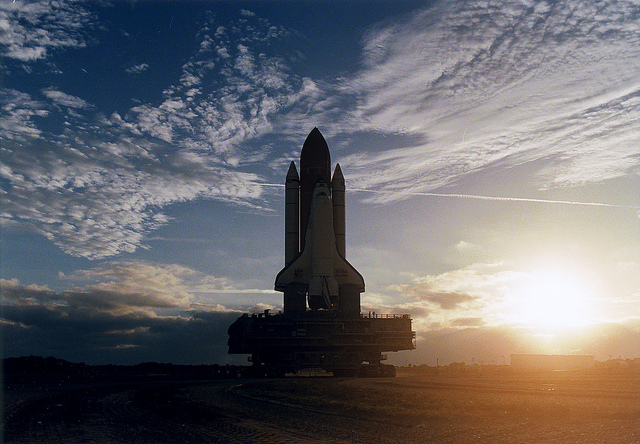 Image courtesy of NASA on The Commons / flickr
Image courtesy of NASA on The Commons / flickr
Space Security: Protecting Our Final Frontier
Accounting for a significant portion of the U.S. Department of Defense’s energy bill, the Air Force has committed to a new energy policy as part of the U.S. Air Force Energy Strategic Plan: mission assurance through energy assurance. While addressing the new energy policy at New America’s “From Blue Skies to Black Starts” event, Secretary of the Air Force Hon. Deborah Lee James discussed the future of the Air Force, highlighting the importance of space security. Secretary James emphasized that mission assurance recognizes a new world order; from ISIS to Russia to China, threats around the world have changed, and as a result, assuring space security must be a key component of U.S. policy.
Although space is not new territory, the culture of space security is shifting with the potential of a terrestrial conflict extending into space, as suggested by Secretary James. Currently, there are five United Nations treaties on outer space that date back to the 1970s and 1980s, which establish the foundation of international space law. While the principles and objectives of the treaties remain relevant in present day, advancements in technology have developed new space threats that are not addressed in existing accords.
In recent years, developments in space weapons and technology, especially anti-satellite weapons, have created a serious national security threat to the United States. Anti-satellite weapons (ASAT) attack satellites using different methods, including: destroying a satellite, blinding a satellite, hacking a satellite, or causing a collision with a satellite. In 2007 China successfully conducted an anti-satellite missile test, suggesting “its rising military intends to contest American supremacy in space.” Six years later, China launched another rocket. U.S. officials and intelligence suspected the rocket “could be used in the future to carry an anti-satellite payload on a similar trajectory.” Most recently, China has launched a ‘hack-proof’ quantum communications satellite, which demonstrates President Jinping’s interest in establishing China as a space power. Russia has also made an effort to keep up in the space arms race, launching and testing an anti-satellite missile known as Nudol in 2015.
Space debris poses an additional threat to space and national security. China’s anti-satellite missile test against its weather satellite in 2007 created many pieces of debris. The space debris environment worsened in 2009 after two satellites collided, leaving significant debris clouds. Increased space debris poses a threat to operational satellites, as well as continued space access. For instance, the International Space Station (ISS) has had to conduct a number of collision avoidance maneuvers to prevent a collision between the ISS and orbiting debris. However, few efforts have been made to remove debris from space.
In 2014, China and Russia introduced a new draft of the Treaty on Prevention of the Placement of Weapons in Outer Space and of the Threat or Use of Force Against Outer Space Objects, known as the PPWT, with the intention to outlaw the weaponization of space. However, the United States, among other countries, found that the PPWT was “fundamentally flawed.”
Specifically, the treaty:
- Lacks a verification mechanism,
- Does not restrict the development and stockpiling of ASAT weapons on the ground,
- Does not address terrestrially-based ASAT systems,
- And fails to mention the issue of space debris.
Given the increasing threat to space security, the U.S. should develop policy that details the norms of space warfare, incorporating the missing components listed above. While current United Nations treaties prohibit the placement of nuclear weapons and other weapons of mass destruction in orbit, they are vague in addressing the current concerns related to space weapons. Moreover, as a product of the recent development, the U.S. policy should address the space debris environment. It should restrict action that would create more debris, while designing a collaborative plan to remove current debris.
In creating a space security policy, the U.S. should consider the underlying framework of the Air Force’s new energy policy, which stresses readiness, resiliency, and efficiency. It is imperative that the United States be ready to defend its space assets and be prepared to recover quickly in case of an attack. While doing so, it is also essential that the U.S. be efficient in maximizing resources and reducing waste. The U.S. should continue to develop its own space program, incorporating terrestrial bound solutions to defend space infrastructure; Nevertheless, the United States must also use public diplomacy to create publicly supported norms that discourage future disputes and ensure space security.





